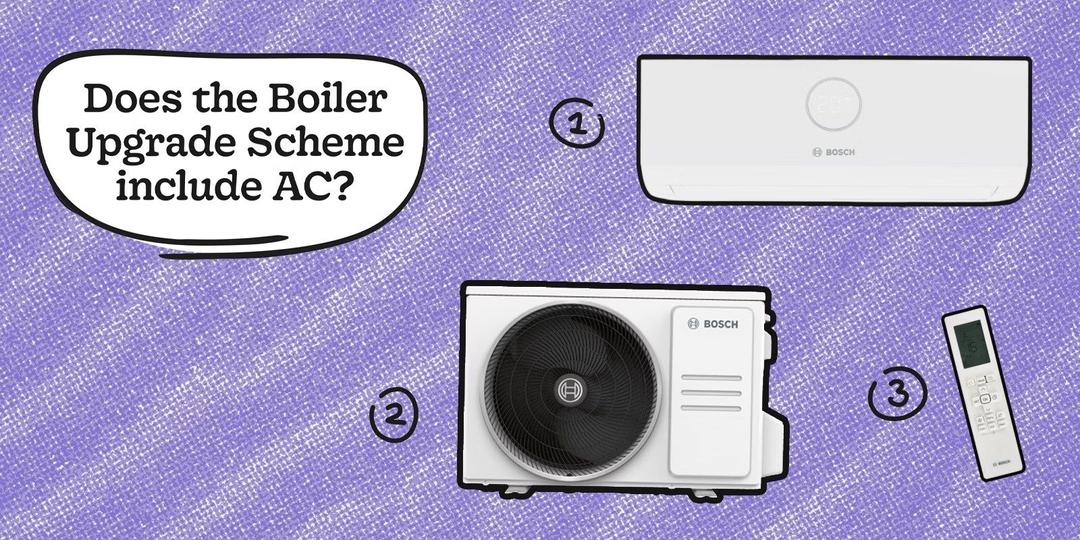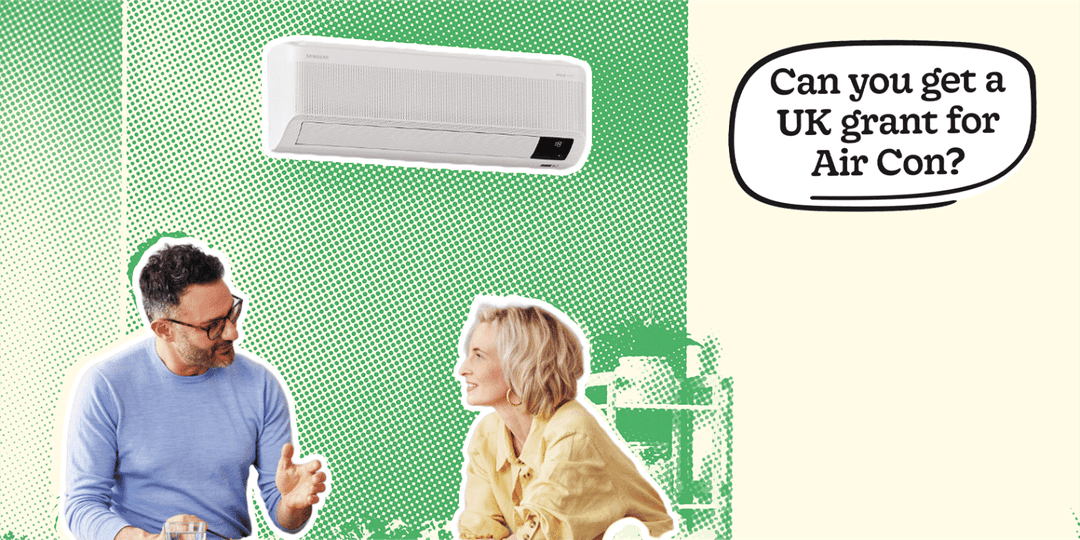UK summers aren’t messing about anymore. With heatwaves topping 35°C in 2024 - and 2026 shaping up to be just as brutal - staying cool is now a full-time mission.
- [1] What’s the Difference Between an Air Conditioner and an Air Cooler?
- [2] Cooling Power: Which One Actually Works in UK Homes?
- [3] Running Costs & Energy Efficiency
- [4] Installation & Maintenance
- [5] Which Is Better for Allergy Sufferers or Asthmatics?
- [6] Initial Cost & Long-Term Value
- [7] When Should You Choose One Over the Other?
- [8] Comparison Table
Air conditioners and air coolers are the main players, but they’re wildly different in how they work, how much they cost, and what kind of relief they offer.
Whether you’re baking in a top-floor flat or sweating through a conservatory sauna, picking the right system matters.
Here’s what you need to know to stay cool, spend smart, and avoid a sweaty regret.
💨 Ready to chill without the guesswork? Find out exactly what size air conditioner you need - and get a fixed price in seconds here.
🔑 Key Takeaways:
ACs deliver precise, powerful cooling (up to 10-15°C temperature drop); air coolers offer a milder breeze (2-5°C drop).
Air coolers sip electricity (80-150W); ACs guzzle more (700-2500W).
Air coolers start at £100-£400; portable ACs £300-£1000; split ACs £1500-£4500.
Air coolers need regular water refills and pad cleaning; ACs require filter cleaning and occasional servicing.
Air coolers add moisture, best for dry climates; ACs reduce humidity, ideal for muggy UK summers.
Air coolers and portable ACs are mobile; split ACs are fixed installations.
[1] What’s the Difference Between an Air Conditioner and an Air Cooler?
Air coolers (aka evaporative coolers) work like turbocharged fans with a watery upgrade.
They pull warm air through damp pads, where evaporation cools it down before blowing it back out.
It’s a bit like getting misted by a coastal breeze - no refrigerants, just a fan, a pump, and a water tank you’ll need to keep topped up.
Air conditioners, on the other hand, are proper heat-extraction machines. They use refrigerant gas to absorb indoor heat and dump it outside via a compressor and condenser.
Portable ACs vent hot air through a hose out the window. Split systems go a step further, with an indoor unit linked to a separate outdoor unit.
The result? Cold, dry air on demand - no matter how hot or humid it gets outside.
[2] Cooling Power: Which One Actually Works in UK Homes?
Air conditioners mean business.
They can slash room temperatures by 10–15°C, even when it’s muggy outside. Look for a SEER (Seasonal Energy Efficiency Ratio) of 7 or higher for solid performance.
Split systems like the Worcester Bosch Climate 3000i or 5000M are perfect for bigger rooms and humid heatwaves, offering powerful, pinpoint temperature control.
Air coolers are more of a gentle breeze. They rely on evaporation to chill the air, cutting temps by 2–5°C in dry conditions.
But in humid UK summers? They often leave you with a damp, underwhelming whimper.
If you live in places like London or Birmingham - where humidity loves to hang around - ACs are hands down the smarter, stronger choice.
[3] Running Costs & Energy Efficiency
Air coolers are the budget kings. Using just 80–150 watts, they cost around 2–4p per hour to run - based on the July–September 2025 electricity rate of 25.73p/kWh (Ofgem). They’re eco-friendly, low-maintenance, and ideal for dry spells or occasional use.
Air conditioners, on the other hand, use more juice. A typical 2.5kW portable AC consumes:
0.3–0.5 kWh per hour for high-efficiency (A+++) models → 8–13p/hour
1.0–1.5 kWh per hour for older or less efficient units → 26–39p/hour
If you run a 2.5kW unit for 4 hours a day over a 60-day summer stretch, you’ll spend:
£19–£31 (efficient unit)
£62–£94 (inefficient unit)
Split systems - like the Worcester Bosch Climate 5000M with SEER ratings of 8 or more - can save £150–£215 over five years versus a portable unit, thanks to better efficiency and smart zoning.
Pro tip: The Energy Saving Trust notes that proper insulation and smart thermostat use can trim AC costs even further.
[4] Installation & Maintenance
Air coolers are as simple as it gets: fill the tank, plug in, and enjoy. No installation, no venting, no hassle. They’re great for renters and easy to move room-to-room.
Maintenance: Daily water top-ups, weekly pad rinsing, and regular mould checks.
Noise: Typically 50–60dB - about as loud as a lively chat.
Portable air conditioners need a window for the exhaust hose, but no professional installation.
Setup: DIY, but expect some faff with sealing kits.
Maintenance: Clean the air filter monthly.
Noise: 50–65dB - similar to a vacuum cleaner.
Split AC systems are the sleek, permanent option - but they need a professional touch.
Installation: Requires a certified F-Gas engineer, wall drilling, and an outdoor unit. Costs range from £300–£800, depending on complexity.
Maintenance: Just an annual filter clean and occasional service (£100–£200).
Noise: Whisper-quiet indoors at 19–40dB - perfect for bedrooms and living areas.
👉 Check our AC installation cost guide for a full breakdown.
[5] Which Is Better for Allergy Sufferers or Asthmatics?
Air conditioners come out on top. Many models - like the Daikin Perfera - include HEPA-style or electrostatic filters that trap dust, pollen, pet dander, and other airborne nasties.
Plus, their dehumidifying action helps prevent mould and mildew, which are major triggers for asthma and allergies.
Air coolers, by contrast, add moisture to the air, which can make things worse in already humid homes. They also require frequent cleaning to avoid bacterial growth in the water tank and pads.
Some coolers include basic mesh filters, but they don’t come close to the filtration or air-purifying power of a decent AC.
If clean, dry air is a priority, an AC is the safer bet.
[6] Initial Cost & Long-Term Value
Air Coolers
💸 £100–£400
Budget-friendly upfront, but with limited cooling power and higher maintenance, they’re best for dry spells - not muggy summers.
Portable ACs
💸 £300–£1,000
Decent option for renters, but noisy operation and higher running costs chip away at long-term value.
👉 See our portable air conditioner guide for full pros and cons.
Split AC Systems
💸 £1,500–£4,500 (inc. installation)
A bigger investment, but higher SEER ratings and lower day-to-day costs make them the best value over time - especially in homes battling repeated heatwaves.
[7] When Should You Choose One Over the Other?
🏡 Renters:
Go for air coolers or portable ACs - no installation, no landlord hassle, and easy to move from room to room.
📏 Large Rooms or Conservatories:
Choose a split AC system like the Worcester Bosch Climate 5000M for powerful, whisper-quiet cooling that covers big spaces with ease.
💰 On a Budget:
Air coolers win on price, but don’t expect miracles during sticky, humid spells - especially in UK cities.
🔥 Heatwave Warriors:
If you’re battling serious heat and humidity, ACs (portable or split) are your best bet for consistent, dry, dependable cooling.
“In many UK homes, a basic air cooler just won’t cut it once temperatures climb past 25°C - especially when it’s humid. If you’re stuck in a stuffy flat or suntrap conservatory, an AC more than earns its keep with precise cooling and cleaner, drier air.” – Patrick Garner, Head of Installations at Heatable
[8] Comparison Table
Feature | Air Conditioner | Air Cooler |
Cooling Power | 10-15°C drop, works in all climates | 2-5°C drop, best in dry conditions |
Energy Use | 700-2500W (7-37p/hour) | 80-150W (2-4p/hour) |
Initial Cost | £300-£1000 (portable), £1500-£4500 (split) | £100-£400 |
Running Cost | £30-£92/year (4h/day, 60 days) | £5-£10/year (4h/day, 60 days) |
Maintenance | Filter cleaning, occasional servicing (£100-£200) | Water refills, pad cleaning |
Noise | 19-65dB (split quieter than portable) | 50-60dB |
Humidity | Reduces humidity | Adds humidity |
Portability | Portable units mobile, split fixed | Fully portable |
Best For | Heatwaves, humid climates, large spaces | Dry climates, small rooms, budget buyers |
Conclusion
Air coolers are a budget-friendly, low-energy option - great for small rooms, dry spells, and renters who want quick relief without the upfront hit.
But when UK summers get muggy and relentless, air conditioners - especially split systems - offer the cooling power, comfort, and air quality that basic fans just can’t match.
For larger homes or humid hotspots, an AC isn’t just a luxury - it’s a smart long-term investment.
Ready to cool down properly?
Explore Heatable’s air conditioning range or get a personalised quote to find your perfect setup.
Next Steps For Your AC Journey:
When planning to install air conditioning for your home, there are several important factors to consider. Make sure to refer to the following guides to help you make informed decisions:
To dive deeper into these topics, head over to our advice section, check out our YouTube channel for informative videos.
Get a Quote for Air Conditioning Today ❄️
Without boasting you should get your new AC installed with us, here's why:
Thousands of Happy Customers: We boast an average score of 4.9 on Trustpilot, outperforming the market leader.
Which? Trusted Trader: Heatable is proudly recognised as a Which? Trusted Trader.
MCS Accredited: Our accreditation by the Microgeneration Certification Scheme (MCS) ensures high-quality standards.
Flexible Payment Options: Choose from multiple payment methods, including finance options.
Fixed Price Guarantee: Enjoy transparency with no hidden costs.
Save Your Quote: You can save your quote and decide later.




